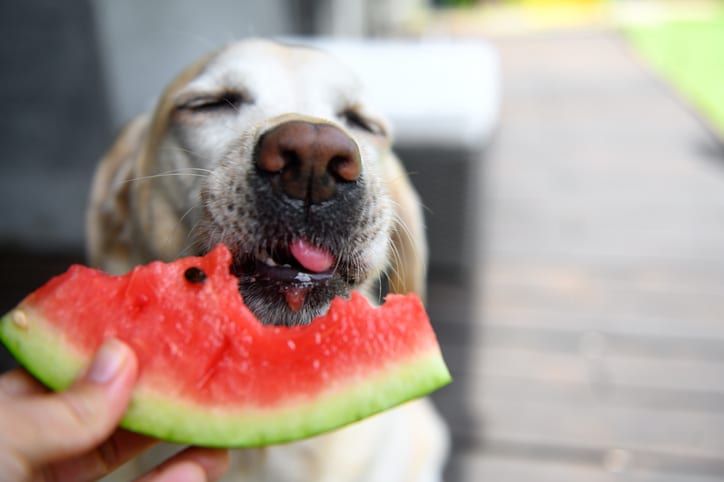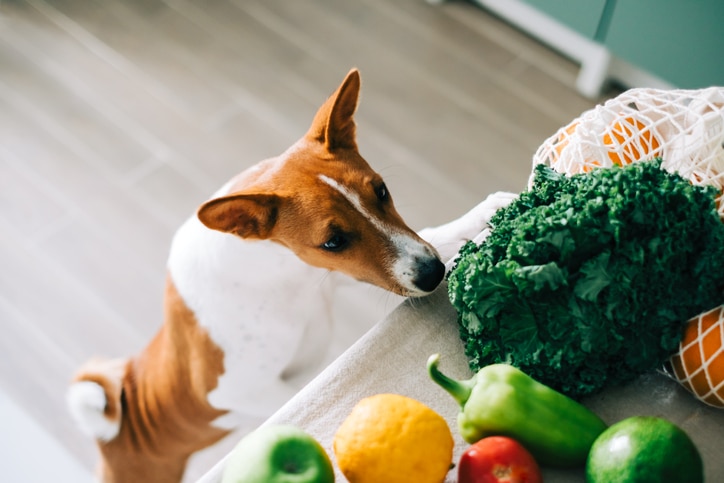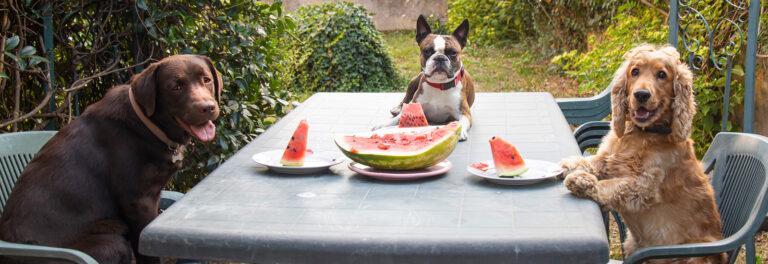When I brought Woodford home back in April 2018 I started to figure out what would be dangerous to him. Woodford largely doesn’t eat human food, but for dogs that eat human food you should understand what they can handle. The list of human foods poisonous to dogs has been well-documented. However, there are still many pet parents who don’t realize how dangerous some of these foods can be.
You should check with your vet for any questions, this just the best information I have on the subject. You also should also keep a first aid kit for pets. Particularly hydrogen peroxide, which you can use to induce vomiting should your dog eat something they shouldn’t.
Dog Food vs. Human Food
Dogs digest foods differently than humans, and eating the wrong foods can lead dogs to long-term health problems and, in extreme cases, even death. As omnivores, dogs have no need for fruits or vegetables in their diet, but an occasional fruit or veggie as a treat is OK. Fresh dog foods also pre-portion fresh veggies into meals. Read on to find out which fruits and vegetables are OK for sharing in moderation, and which should be avoided.
Fruits that Are and Aren’t Edible for Dogs
Dogs are known as man’s best friend, and for good reason. They are loyal, friendly, and always happy to see their humans. However, what many dog owners may not know is that some fruits can be poisonous to their furry friends. In this blog post, we will discuss the fruits that are most harmful to dogs, and provide some tips on how to keep your dog safe.

Apples can be eaten by dogs. Apples provide your dog with vitamins A and C, as well as fiber. The seeds and core should be removed first. Try them frozen for an icy warm weather snack.
Dogs should not consume avocados. Avocado may be a healthy snack for dog owners, but dogs shouldn’t eat it. Avocado pits, skins, and leaves contain persin, which causes dogs to vomit and have diarrhea. Although the fleshy interior of the fruit does not contain as much persin as the rest of the plant, dogs cannot handle it.
Yes, dogs can eat bananas. In moderation, bananas are a great low-calorie treat for dogs. They’re high in potassium, vitamins, biotin, fiber, and copper. They are low in cholesterol and sodium, but because of their high sugar content, bananas should be given as a treat, not part of your dog’s main diet.
Blueberries are safe for dogs to eat. In humans and dogs alike, blueberries are rich in antioxidants, which prevent cell damage.
Dogs can eat cantaloupe. Cantaloupes are packed with nutrients, low in calories, and high in water and fiber. Since it is high in sugar, it should be shared in moderation, especially with overweight or diabetic dogs.
Cherries should not be eaten by dogs. Except for the fleshy part around the seed, cherry plants contain cyanide and are toxic to dogs. By disrupting cellular oxygen transport, cyanide prevents your dog’s blood cells from getting enough oxygen. Watch for signs of cyanide poisoning in your dog if he eats cherries, such as dilated pupils, difficulty breathing, and red gums.
Cranberries are safe for dogs to eat. Dogs can be fed dried cranberries and fresh cranberries in small amounts. Dogs should be fed cranberries in moderation, as with any treat, since too many cranberries can upset their stomach.
Dogs can eat cucumbers. Because cucumbers contain few carbohydrates, fats, or oils, they are especially good for overweight dogs.K, C, and B1, as well as potassium, copper, magnesium, and biotin.
Dogs should never eat grapes. No matter the dog’s breed, sex, or age, grapes and raisins (dried grapes) are toxic to dogs. Grapes are so toxic that they can cause acute kidney failure. You should always keep your dog away from this dangerous fruit.
Mangoes can be eaten by dogs. This sweet summer treat is packed with four different vitamins: A, B6, C, and E. Make sure the hard pit is removed before eating, as it contains small amounts of cyanide and can cause choking. As mangoes are high in sugar, they should only be eaten occasionally.
Oranges are safe for dogs to eat. In small quantities, oranges can serve as a tasty treat for your dog, as they are rich in vitamin C, potassium, and fiber. The peel should be thrown away and the orange flesh, without seeds, should be given to your dog. Dogs’ digestive systems might be upset by orange peel, and its oils may cause their noses to tingle.
It is safe for dogs to eat peaches. Fresh or frozen peaches are an excellent source of fiber and vitamin A, and the pit can even help fight infections, but just like cherries, they contain cyanide. A fresh peach can be a fantastic summer treat as long as you cut it completely around the pit first. Sugary syrups are usually found in canned peaches, so avoid them.
Dogs can eat pears. Pears are a great snack because they’re packed with copper, vitamins C and K, and fiber. Remove the pit and seeds from pears first, since they contain cyanide. Only feed your pup fresh pears since canned pears usually have sugary syrups.
Pineapple is safe for dogs to eat. Providing you remove the prickly exterior peel and crown of the pineapple, a few chunks of pineapple are a great sweet treat for dogs.
Pure pumpkin is a great snack for dogs and a very healthy choice. Aside from improving your dog’s skin and coat, it helps with digestion and can relieve diarrhea and constipation. Don’t feed your dog pumpkin pie mix. When buying canned pumpkin, make sure it’s 100% pumpkin. Additionally, pumpkin dog treats and supplements are available.
Dogs can eat raspberries. Raspberries are fine in moderation. They contain antioxidants that are great for dogs. They’re low in sugar and calories, but high in fiber, manganese, and vitamin C. Raspberries are especially good for senior dogs because they have anti-inflammatory properties, which can help aging joints. However, they do contain small amounts of xylitol, so limit your dog to less than a cup of raspberries at a time.
Yes, dogs can eat strawberries. Strawberries are full of fiber and vitamin C. Along with that, they also contain an enzyme that can help whiten your dog’s teeth as he or she eats them. They contain sugar, so be sure to give them in moderation.
Dogs shouldn’t eat tomatoes. In general, ripened tomato fruit is considered safe for dogs, but the green parts of the plant contain a toxic compound called solanine. To be safe, it’s better to avoid tomatoes altogether just in case your dog eats a large amount of the plant.
Watermelon can be eaten by dogs. Watermelon flesh is safe for dogs if the rind and seeds are removed first, as they can cause intestinal blockage. On hot summer days, your dog will benefit from watermelon’s 92 percent water content to help stay hydrated.
Vegetables that Are and Aren’t Edible for Dogs
Some vegetables can be healthy for dogs in some cases, but unhealthy in others. Some vegetables, such as broccoli, are high in fiber and can help keep a dog’s digestive system healthy, while other vegetables, such as onions, can be poisonous to dogs. It is always best to consult with a veterinarian before feeding a dog any vegetables to ensure they are safe and beneficial. Though this list provides a good rule of thumb.

Asparagus should not be eaten by dogs. In spite of the fact that asparagus isn’t necessarily harmful for dogs, there’s no point in giving it to them. Asparagus is too tough to eat raw, and once cooked, it loses its nutrients as it becomes soft enough for dogs to eat.
In very small quantities, broccoli is safe for dogs to eat, but it is best served as a treat on occasion. There is a high fiber content and a low fat content in this food. Broccoli florets, however, contain isothiocyanates, which can cause mild-to-severe gastric irritation in some dogs. Furthermore, broccoli stalks have been known to cause esophageal obstructions.
Brussels sprouts are safe for dogs to eat. Both humans and dogs benefit from Brussels sprouts’ nutrients and antioxidants. Do not overfeed them to your dog, however, because they can cause a lot of gas. Dogs can also eat cabbage, but it comes with the same gassy warning as humans!
Dogs can eat carrots. Carrots are a low-calorie snack that’s high in fiber and beta-carotene, which produces vitamin A. This orange veggie is also good for your dog’s teeth (and fun), and many dog foods include it.
Celery is safe for dogs to eat. This crunchy green snack is packed with vitamins A, B, and C, as well as nutrients that help promote a healthy heart and fight cancer. In addition, celery also freshens the breath of dogs.
Green beans can be eaten by dogs. Chopped, steamed, raw, or canned – as long as they are plain, green beans are safe for dogs to eat. In addition to being full of vitamins and minerals, green beans are also rich in fiber and low in calories.
Mushrooms should not be eaten by dogs. Dogs can be poisoned by wild mushrooms. There are only 50-100 toxic mushroom species worldwide, but those that are toxic can seriously harm or kill your dog. Fido could eat clean white mushrooms from the supermarket, but it’s better to be safe than sorry; don’t feed him fungi.
Onions should never be eaten by dogs. Allium plants, such as onions, leeks, and chives, are poisonous to most pets, especially cats. In addition to rupturing your dog’s red blood cells, onions can also cause vomiting, diarrhea, stomach pain, and nausea. The danger of onion poisoning is greater in Japanese breeds of dogs such as Akitas and Shiba Inus, but it is very serious for all dogs.
Dogs can eat peas. Peas like green peas, snow peas, sugar snap peas, and garden peas are all okay for dogs to find in their bowl on occasion. Peas have several vitamins, minerals, and are rich in protein and high in fiber.
No dogs can’t eat peas. Rhubarb is a vegetable, though some people think it’s a fruit, because it’s often used in jams and pies. This plant can be bad for pets’ kidneys and digestive organs.
Spinach can be eaten by dogs, but it’s not one of the top vegetables you should share with them. Due to spinach’s high oxalic acid content, it can damage kidneys by blocking the body’s ability to absorb calcium. To have this problem, your dog would probably have to consume a large amount of spinach, so choose another vegetable instead.
Foods that are Poisonous for your Dog
Here is a list of some common foods that are poisonous to dogs:
Alcohol can poison dogs. Not just beer, wine, and liquor but mouthwash and fermented foods can be poisonous to dogs and cats, as well. Symptoms range from loss of coordination, drowsiness, and vomiting to seizures, respiratory failure, and even death.
Don’t be fooled by dog beers and wines like Bowser Beer. There is no such thing as dog alcohol. These are packaged like regular alcoholic beverages but should contain no alcohol; they are simply a marketing gimmick.
Chocolate is toxic to dogs. It can cause vomiting, diarrhea, heart arrhythmias, and seizures and even be fatal due to an ingredient in chocolate called theobromine, which can be poisonous to pets.
Nuts are often salted, which is bad for dogs. However, macadamia nuts can cause vomiting, fever, and many other symptoms. Macadamia nuts often top the list of foods not to feed your dog.
Large amounts of salt can lead to salt poisoning. The effects are neurological including seizures.
Some people swear by its benefits, while others warn of the dangers. So, can dogs eat peppermint oil? The answer may surprise you. While peppermint oil is safe for dogs in small quantities, it can be toxic if ingested in large amounts. Therefore, it’s important to consult with your veterinarian before giving your dog any peppermint oil.
Lavender belongs to the mint family, and while it is safe for humans to eat in small quantities, it can be toxic to dogs if consumed in large amounts. Symptoms of lavender toxicity include vomiting, diarrhea, and seizures. If you think your dog has eaten lavender, it’s important to contact your veterinarian immediately. While lavender is generally considered safe for dogs, it’s always best to err on the side of caution.
Rosemary is generally considered safe for dogs to eat in small quantities. However, it is important to note that rosemary contains a compound called eucalyptol, which can be toxic in large amounts. For this reason, dog owners should use moderation when feeding their pet rosemary. In addition, rosemary plants can contain sharp thorns that could hurt your dog if he or she tries to chew on them. If you have rosemary plants in your home, it is best to keep them out of reach of your dog to avoid potential accidents.
While there’s no definitive answer, it’s generally advisable to err on the side of caution and avoid feeding your dog cinnamon. Some dog breeds are more sensitive to spices than others, so even a small amount of cinnamon could cause stomach upset or other health problems. And because cinnamon is often used in sweet treats, it can also be difficult to resist giving your dog a little taste. But unless you’re sure your dog can handle it, it’s best to stick to dog-friendly foods.
Ingredients in Food that can Harm your Dog
There are Ingredients in other foods that can harm your dog, while they are not poisonous you should be aware of their affects:
Dogs become less able to digest milk as they get older much like the same way it does in adult humans. It probably won’t kill them but they may get diarrhea and other digestive problems.
This stimulant can damage a dog’s nervous system, heart, and other organs. In addition to coffee and tea, soda, ice cream, and medications should be off-limits.
This fungus is dangerous for dogs, as it can expand in their stomach and cause organs to tear or twist.
This spice often found in deserts can cause tremors and seizures.
The sugar substitute xylitol can cause a dog’s insulin to spike and is often found in dietary products like sugarless chewing gum, candy, condiments, and some peanut butter.
Some dogs seem to tolerate coconut oil well, while others may experience digestive issues. If you’re considering adding coconut oil to your dog’s diet, it’s best to speak to your veterinarian first. They can give you specific advice based on your dog’s individual needs.
It’s a question that dog owners have been asking for years: what peanut butter is safe for dogs? Peanut butter is a favorite treat for dogs. The answer, it turns out, is not as simple as it might seem. For the most part, any peanut butter that does not contain xylitol – a sweetener toxic to dogs – is safe for your furry friend. However, some brands of peanut butter do contain other ingredients that might be harmful to your dog, so it’s always best to check the label before feeding them a tasty treat. In general, dog-friendly peanut butters are those made with natural ingredients and do not contain any added sugars or salt. So, next time you’re looking for a safe and healthy snack for your dog, reach for a natural peanut butter without any added ingredients.
Human Foods that are Good for Dogs
Woodford has a sensitive stomach, and since the dog’s digestive system is fragile, I avoid many human foods. I also have the problem where he seldom has weight gain, even though he has access to treats and pet food whenever he wants. Many dogs eat human food, and there are many raw and natural foods made for dogs specifically. You’ve probably seen them in the refridgerated section of the super market.
Boiled Chicken
When Woodford has an upset stomach, I feed him boiled chicken mixed with rice. Our vet recommended this to us. However, you need to make sure there isn’t too much fat in your chicken especially if you are
White or Brown Rice
Brown rice is a complex carbohydrate high in fiber and vitamins. It is also low in fat and calories, making it a perfect food for dogs who need to lose weight or have sensitive stomachs.
Eggs
The benefits of feeding eggs to dogs are many. Eggs are a complete protein, meaning they have all the essential amino acids needed to build muscle. They’re also high in choline, an important nutrient for brain health, and vitamin B12, which is essential for red blood cell production. Eggs are also low in calories and fat, making them a healthy choice for overweight or obese dogs. You can feed them scrambled eggs or even crack raw eggs over their food.
Sweet Potatoes
Sweet potatoes are a perfect food for dogs. They are high in fiber, vitamins A and C, and beta-carotene. Sweet potatoes can help dogs maintain a healthy weight, and they are also great for dogs with sensitive stomachs.
When in doubt, don’t give human food to your dog
As a pet owner, it is important to be aware of the foods that can be poisonous to your dog. While it’s hard to say what plans and animals are considered, “dog food” many dogs eat the same thing you do, and for dogs that eat human food you should understand the potential dangers. Some of these may seem like common sense, others may surprise you. It is important to keep all harmful foods out of reach and to monitor what your dog eats. If you think your dog has ingested a poisonous food, contact your veterinarian immediately.

